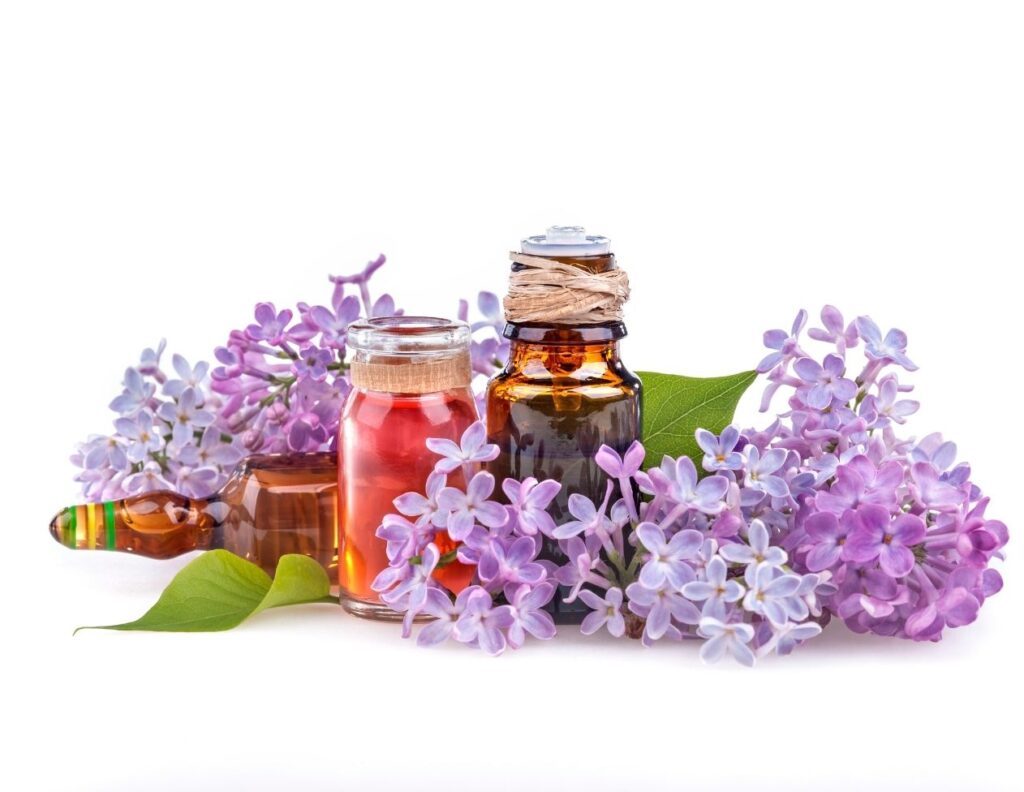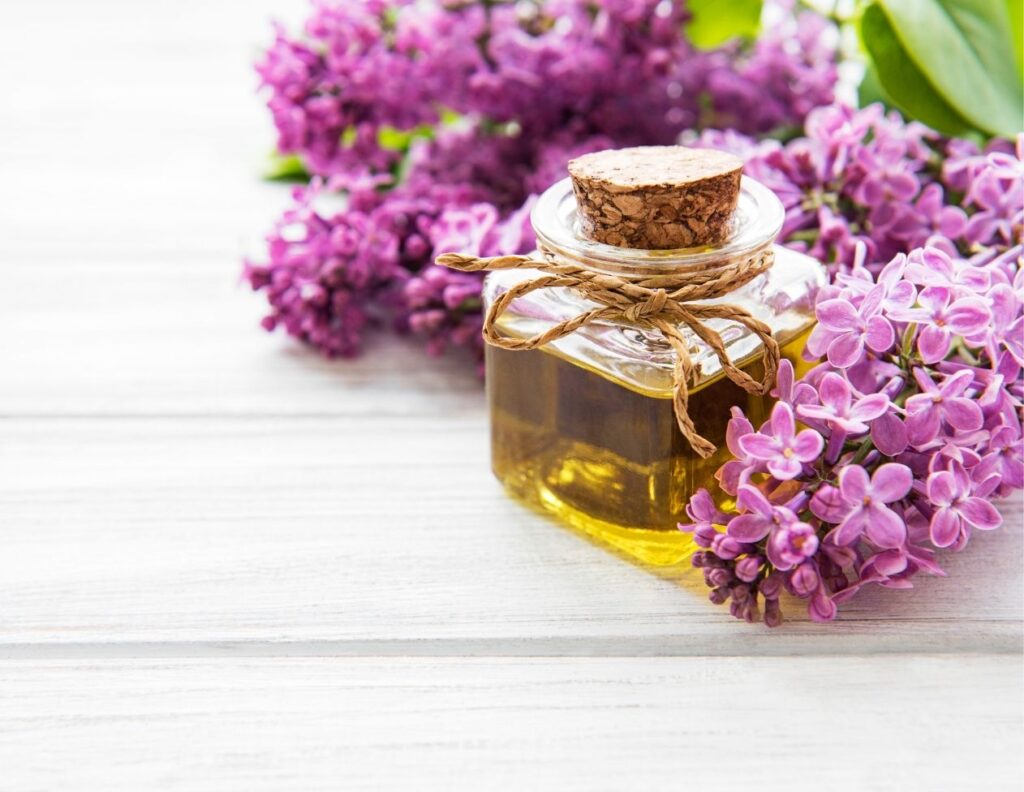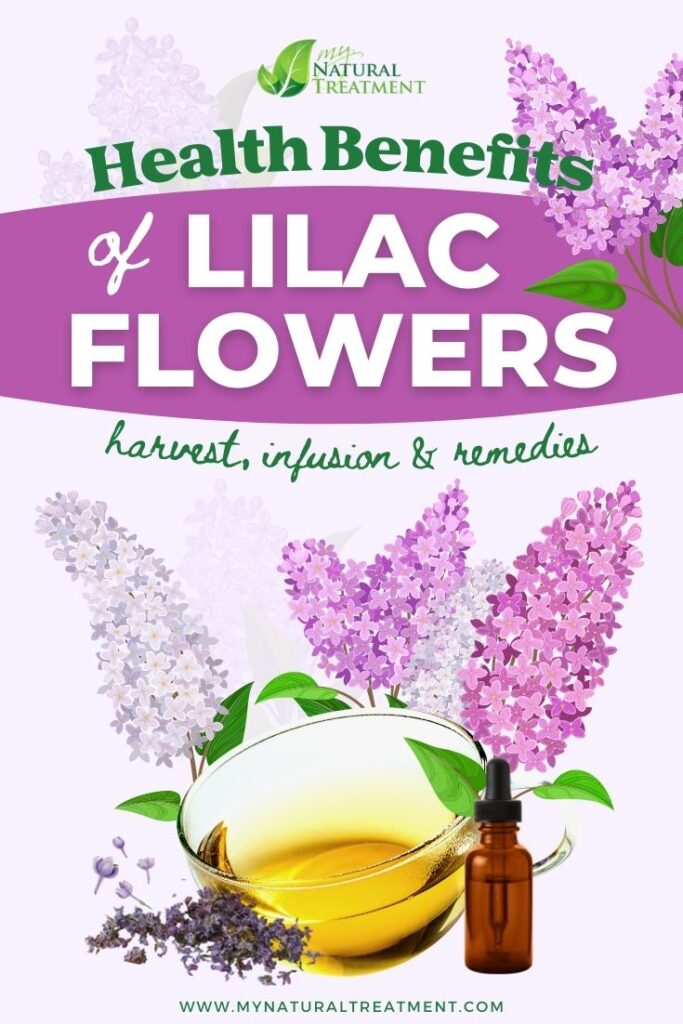Want to learn more about the health benefits of lilac flowers, either lilac flowers are edible, and how to harvest lilac flowers and use them in natural remedies? Continue reading this article and find the answers to all of your questions.
Lilac (Syringa vulgaris) is known for its gorgeous and beautifully scented flowers, but did you know that lilac flowers are good for your health also? Indeed, there are many health benefits of lilac flowers, as people have used these lovely flowers since very old times to make lilac flowers infusion and other therapeutics with them. The lilac tree bark, flowers, and leaves are used for their amazing health benefits, but here we’re going to focus on the health benefits of lilac flowers, their uses, and natural remedies with lilac flowers. Before we get to it, a few things.

In This Article You Will Find:
How to Harvest Lilac Flowers
The lilac flowers are harvested when more than three-quarters of them have fully bloomed. Detach them from the axis of the inflorescence and leave them to dry for a few days inside the house, while their strong scent purifies the air in the rooms of your house. Ideally, dry lilac flowers on balconies, attics, porches, or other ventilated spaces. Place them in a thin layer and mix them daily to help dry thoroughly. Avoid temperatures above 30°C (86°F). After they have completely dried, store them in paper bags or in large jars with a lid. Now let’s get to the health benefits of lilac flowers.
Are Lilac Flowers Good for You?
Yes, lilac flowers are good for you, they are edible and also have healing properties due to the volatile oils they contain. These volatile oils are also responsible for the distinguished and splendid perfume of the lilac flowers.

Health Benefits of Lilac Flowers
The health benefits of lilac flowers are numerous and surprising. This is due to the fact that lilac flowers and leaves contain sucrose, syringin, emulsin, neooleuropein, syringopicrin, and other active elements which give them astringent, revulsive, tonic, calming, vasodilating, deworming, stomachic, antirheumatic properties.
Lilac leaves and flowers have tonic, astringent, and revulsive effects and can alleviate many ailments such as rheumatism, liver issues, respiratory and digestive conditions, as well as diabetes. In the past, people would swallow lilac flowers to get rid of intestinal parasites or malaria.
Lilac flowers infusion is a real cardiovascular tonic. This infusion can streamline arterial blood circulation and cause the aorta to receive the optimal dose of blood. The infusion is also recommended for the treatment of respiratory diseases, and liver diseases, but it is also useful in cases of high fever. The lilac flowers are also used by women who want to get pregnant or treat infertility. For this, women prepared a therapeutic wine in which they boiled lilac flowers. Hence, the main health uses of lilac flowers are:
- rheumatic pain
- joint pain
- gout
- diabetes
- bloating and gas
- insomnia
- stress
- bad breath
- toothache
- wounds and concussions
Now that you know what are the health benefits of lilac flowers, learn how to make lilac flowers infusion, tincture, salve, and oil by following the simple recipes below.
1. How to Make Lilac Flowers Infusion
To make lilac flowers infusion, add two tablespoons of lilac flowers to 250 ml (1 cup) of boiling water. Steep for 30 minutes, then strain the lilac infusion. Sweetens to taste with honey. This infusion can also be prepared from dried lilac leaves. In this case, crush the leaves before use, to help them release their oils into the infusion.

2. How to Make Lilac Flowers Tincture
To make lilac flowers tincture at home, fill a wide neck half-liter (16 oz) glass bottle or jar with fresh or dried lilac flowers up to the top. Pour 40 degrees alcohol over the flowers (at a 1:10 ratio) and leave to soak for 21 days in a dark place. Strain and squeeze well the lilac flowers to get all the tincture out. Store the lilac flowers tincture in small amber bottles with a dropper.

3. How to Make Lilac Flowers Salve
To make lilac flowers salve, mix two tablespoons of chopped lilac flowers with 2 tablespoons of butter (melted pork lard or goose fat) in a glass bowl. Put the mix over a steam bath for 30-40 minutes, while mixing from time to time. Leave the lilac flowers salve to cool down, pour it into a small glass container with a sealed lid, and store it in the refrigerator.

4. How to Make Lilac Flowers Oil
To make lilac flowers oil, steam 10 grams of dried lilac flowers together with 100 ml of sunflower oil on a double boiler for a few minutes, in a glass bowl. Pour in a large sealed jar for 2 days, then strain the oil. Pour the obtained lilac oil into an amber glass bottle.

6 Natural Remedies with Lilac Flowers
1. Diabetes
One of the best-known health benefits of lilac flowers is in alleviating diabetes. In this case, the decoction of lilac buds is recommended. The lilac buds are actually lilac flowers harvested in early spring right before they are ready to “crack” open. The buds are dried, ground, and stored in sealed jars, just like lilac flowers. Pour 200 ml (7 oz) of hot water over two tablespoons of lilac buds powder, boil on low heat (or steam bath) for 15 minutes, then strain. Pour hot water so that, in the end, you have the initial quantity before boiling. The dose is 1 tablespoon 3 times a day. Lilac buds are also amazing for coronary heart problems.
2. Gout and Rheumatoid Arthritis
Another one of the health benefits of lilac flowers is soothing gout and pain related to rheumatoid arthritis. The recommended dose is 30 drops of lilac flowers tincture (recipe above) with 50 ml of water, 3 times a day, before meals, for 3 months. Concomitantly, you can use the lilac flowers tincture topically, to rub the painful areas or make poultices with it, or rub the painful areas with the therapeutic lilac flowers oil prepared according to the method presented above. To boost its revulsive properties, add 2 teaspoons of rosemary to the therapeutic oil when preparing it. This natural remedy is also recommended in bone spurs and urea deposits in the joints, causing pain.

3. Wounds
One of the most popular health benefits of lilac flowers is in the treatment of wounds and concussions. In this case, the same lilac flower tincture can be used to make poultices. Change the poultice 3-4 times a day. But this time, you can prepare a tincture with greater alcohol content, especially for topical use. Namely, 1 cup of lilac flowers per 0.5 liters of homemade alcohol. Soak for two weeks, and the tincture is done. This simple natural remedy with lilac flowers is also great for concussions and rheumatic pains.
4. Bad Breath
Lilac flowers have health benefits even for ailments of the oral cavity, especially in the breath (halitosis). For this, make gargles with lilac flowers infusion or decoction, after each meal and in the evening, before bedtime.

5. Insomnia
To fight insomnia, enjoy 3 cups of lilac flowers infusion a day, sweetened to taste with honey. To make this infusion even more potent, add a teaspoon of lavender flowers to the infusion when making it.
6. Stress
Amongst the top health benefits of lilac flowers is in relieving stress and inducing relaxation. You can also use lilac flowers for that needed relaxation after a stressful day or a busy working week. To enjoy the relaxing properties of lilac flowers, pour a concentrated lilac flowers infusion into your bathwater. To make the lilac infusion, add 1 cup of lilac flowers into a 3-liter pot (106 oz) of hot water. Infuse for a few minutes, then strain it and pour the lilac flowers infusion into your bathwater. Enjoy a relaxing bath time, where stress and worries no longer exist.

Lilac Flowers Are Healing
With its amber-scented flowers and dresses in the softest shades of white, purple, and pink, the lilac tree is the ace of hearts of spring and passionate love. This does not prevent the lilac, however, from being a guardian of nature and a soother of human suffering. Lilac is rich in aromatic oils and has been used in both natural therapies and natural cosmetics for ages. Indeed, there are many health benefits of lilac flowers.
Read More About Lilac:
4 Health Benefits of Lilac Bark, Uses and Remedies
7 Health Benefits of Lilac Leaves, Uses, and Natural Remedies
If you’ve enjoyed our article on the health benefits of lilac flowers and how to make lilac flowers infusion, oil, tincture, and salve, and the natural remedies with lilac flowers, please share this article so more people can use this information. Stay healthy, naturally!
Share on Pinterest ❤️

